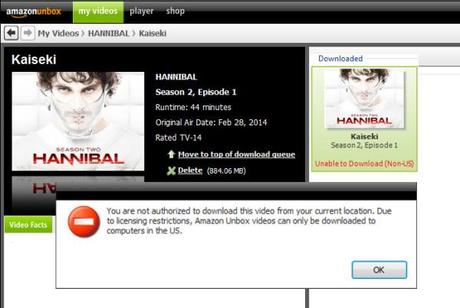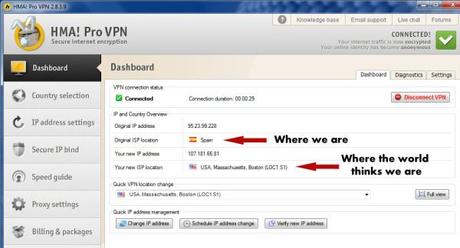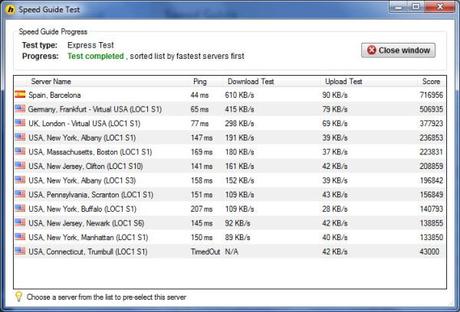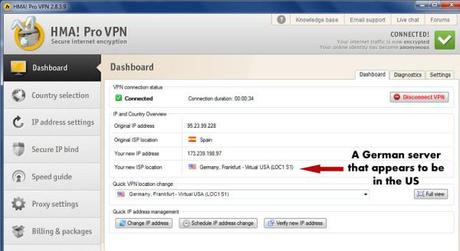
Just imagine, you’re in the Berlin airport staring down the barrel of a five-hour layover. Fortunately, you came prepared. You fire up your Netflix account hoping to while away your downtime watching House of Cards only to be greeted by a message saying you can’t watch anything from your current location.
One of the annoying inconveniences of traveling overseas is the inability to stream domestic televisions shows while outside the country. License restrictions generally prevent services like Netflix and Hulu from working internationally. Sure, you can buy a Game of Thrones episode off Amazon’s Instant Video service from anywhere in the world, but you won’t actually be allowed to watch that video until you’re back in the States. Even otherwise free content from the big broadcasters, like NBC, won’t stream overseas.
Good thing there are some work arounds.
In order to get that House of Cards episode streaming while you’re waiting in the Berlin departure lounge, you need to make the world think that you’re still in the U.S. One way to do that is by changing your computer’s IP address by using either a proxy server or a Virtual Private Network (“VPN”).

This is what we use
If that sounds daunting, don’t worry, it’s not. There are plenty of software options available that make it super easy.
If all you’re looking to do is stream Netflix while traveling then using a proxy server is probably the most straightforward way to go. Companies like Hot Spot Shield have servers all over the world and, for a fee (or free with advertising), allow you to direct your internet traffic through them. By directing your internet traffic through a U.S. server it looks to the world like your computer is located inside the U.S., even if it is not. There may be many reasons for wanting to virtually change your computer’s location in this way, but one important one is to get those pesky video streaming serves to operate while overseas.
Another way to accomplish the same thing is to set up a Virtual Private Network (“VPN”). The concept behind a VPN is similar to how a proxy server works, but VPNs have some important benefits that are particularly attractive to travelers like us. The most important of which is that VPNs encrypt all of your internet traffic while a mere proxy server does not.
Through the use of VPN software you establish a secure, encrypted connection between your computer and the VPN provider’s proxy servers. That way anyone trying to snoop on the data you send over the internet will see nothing but a seemingly random jumble of characters.
VPN, Don’t Leave Home Without It
That’s hugely important for us considering how much time we spend using public wifi to connect to the internet. Most of the time we have no other choice. And that’s where VPNs shine.
Because we use ours mainly to encrypt banking transactions and other sensitive information that we often have to send over public wifi networks, we’ve decided to pay for VPN service from a large, reputable, U.S. based company like Hide My Ass. You can find less expensive or even free VPN services out there, but we wanted a well-established brand rather than a fly-by-night shop to handle our most important electronic communications.
We also found VPNs to be useful in other ways. In Belize we learned that the local phone monopoly was blocking our Skype calls. Once we encrypted our internet connection through a VPN the phone company couldn’t distinguish Skype traffic from other internet traffic and our calls sailed through.
Of course the point of this article is about streaming video while overseas, and some VPNs allow you to do that as well. From here on out we’ll talk specifically about Hide My Ass because that is the VPN we have the most experience with. And one thing we can tell you is that the software is super easy to use.
To change your computer’s IP Address to a U.S. location all you have to do is log into the software, select a server from a dropdown box, hit the “Connect” button and you’re done.

HMA’s dashboard tells you that your data is encrypted and also tells you where your traffic is being directed through.
Of course if you’re planning to stream video you’ll want to work off of a fast proxy. Fortunately HMA makes it super easy to run speed tests on their various servers to see which ones have the fastest download and upload times before connecting. To run the tests all you have to do is go to the “Speed Test” tab, check the box next to the servers you want to evaluate, hit the “Express Test” button, and the software will rank your chosen servers from fastest to slowest. Double click on the server you want from the test results page and you’ll be connected to that server.

One thing to know is that re-directing your internet traffic through distant servers can slow down your internet connection. Obviously bouncing data from Singapore to New York and back is going to take longer than working through local servers. Your fastest connections will almost always be through servers near your physical location.

But if you’re stuck in the Berlin airport trying to watch House of Cards you really need a connection that is as fast as possible. That’s why HMA offers a global network of “virtual” U.S. servers. These are servers physically located in places like Frankfurt, Germany, and Sydney, Australia, that nonetheless report U.S.-based IP addresses. That way you can connect to a fast server in Germany and still have Netflix treat you like you haven’t left the U.S.

